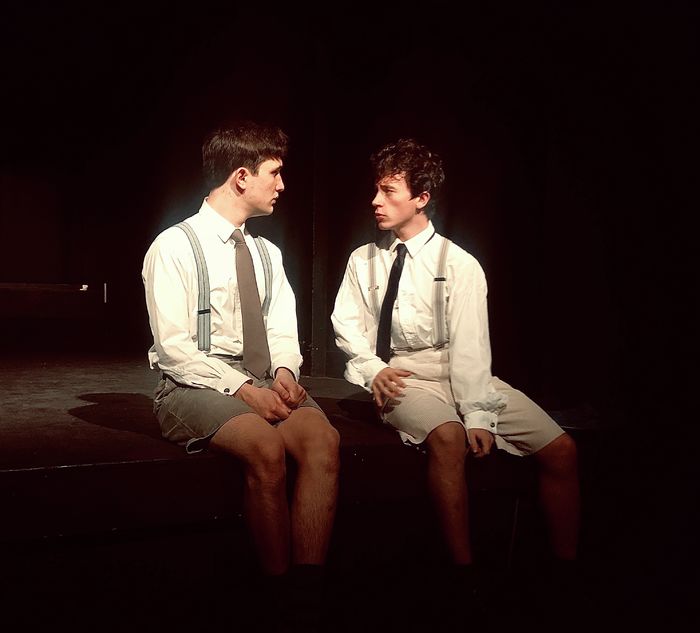Perfection is an unattainable dream unleashing paranoia in Perfect Mendacity
This year’s Corpus Freshers’ Play only got better as it went on for Jess Ma, but has a muddled beginning which left the audience befuddled for too long

Perfect Mendacity is a play about the collision of lies and truth and its reverberations, culminating in the complete breakdown of morality and sanity. Perfection here is unattainable: it is a mere joke, reflected in the daily mundanities laced among the gaps between grand confrontations of the protagonist Walter Kreutzer’s (Hal Barrow) struggle to lie to himself.
Walter Kreutzer (Hal Barrow), a microbiologist who works as a defence contractor, faces a lie detector test on charges of leaking government secrets. Cheating the lie detector test was the only way for him to salvage his life, yet as he tries to learn the tricks to do this, every interaction around him seem to invite suspicion - his best friend Roger Stanhope (Zachary Aw) is spying on him, his wife Samira (Emma-Rose Bouffler) keeps bringing up old wounds, while his polygraph consultant D’avore Peoples (Anna McDonald) has an uncanny knowledge of his background.
The Fletcher Players’ rendition of the black comedy was a crescendo, only getting more engrossing as the play went on, ending with an unexpected twist as well. The production pared back the grandiose context of the plot to its very core theme of deception through simple but effective stage setting and lighting, which successfully amplified the subtleties of emotional and relational shifts among the characters. The minimal use of music and sound effects was a clever decision as it added to the minimalism and rawness of the play, consolidating the actors’ delivery as focus, while the timely and creative use of lighting viscerally visualised a few important scenes, strengthening their impact and striking the hearts of the audience.
The Fletcher Players’ rendition of the black comedy was a crescendo, only getting more engrossing as the play went on
However, dunking the audience right into the deep end at the beginning of the play, with little to no contextual hint as a guide nor sufficiently arresting dialogue to keep the audience intrigued and motivated to tease out the plot, was not a wise move. Given that the script was fixed, more direction might have been helpful to direct viewers on the background of the story and add dynamism to a lengthy and confusing beginning. It ended up being confusing to the audience, as they have to guess the lead-up as the plot progresses rather quickly in the first few scenes, where a fair amount of clues and background context (figured out in hindsight!) were flung around casually, expecting the audience to catch on as swiftly as the characters were flitting back and forth various events, scattered in time, in amongst their bickering. This simply was not ideal for the audience to appreciate the competent acting or explore the nuances of the theme as they remain preoccupied with basic comprehension of the plot.
Whilst this opening scene made up a significant part of the play, thankfully, the scramble to piece together the plot died down before the play reached midway, allowing the audience to be completely immersed in the competent acting. Hal Barrow’s frantically suspicious protagonist Walter Kreutzer was nuanced, as the character’s blunt sense of humour and sarcasm shone through the natural and convincing portrayal of encroaching insanity punctuated with existential struggle; Emma-Rose Bouffler’s Samira Kreutzer was equally skillful, exhibiting a balance between tenderness and vicious, snappy outbursts. She pulled off an astoundingly smooth portrayal of the master deceiver the character was, seamlessly morphing reality with deception and vice versa. Anna McDonald’s D’Avore Peoples nailed the cheekiness of the role perfectly, but could benefit from more confidence in her talents. Eleanor Ivimey-Parr’s cold scientist Dr. Doll was exactly who she was meant to be - proud and self-interested with a tinge of callousness.
Yet none beat the star power of the swashbuckling Zachary Aw, whose delightfully brash portrayal of the shrewd and slippery Roger Stanhope stole the scene from his first entry, emerging as the true star of the show. Aw’s natural mastery of comedic timing and commanding presence not only brought the character to life, but also acted as a pillar to the comedic element of the play. Aw’s cocky expressions and his trademark innocuous grin belie the facade of flamboyant generosity from his character’s words, rendering Roger Stanhope an enigmatic figure right from the beginning. The character’s final monologue was delivered fantastically to showcase his road to complete corruption.
This year’s freshers’ play of Corpus Christi College continues the usual high quality of Corpus productions, but could benefit from better pacing to further immerse viewers into the story.
 News / CUP announces funding scheme for under-represented academics19 December 2025
News / CUP announces funding scheme for under-represented academics19 December 2025 News / SU reluctantly registers controversial women’s soc18 December 2025
News / SU reluctantly registers controversial women’s soc18 December 2025 News / Cambridge welcomes UK rejoining the Erasmus scheme20 December 2025
News / Cambridge welcomes UK rejoining the Erasmus scheme20 December 2025 Features / Should I stay or should I go? Cambridge students and alumni reflect on how their memories stay with them15 December 2025
Features / Should I stay or should I go? Cambridge students and alumni reflect on how their memories stay with them15 December 2025 Film & TV / Timothée Chalamet and the era-fication of film marketing21 December 2025
Film & TV / Timothée Chalamet and the era-fication of film marketing21 December 2025











